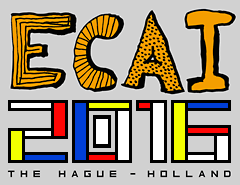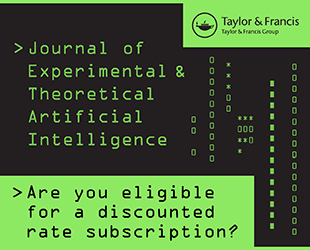For program details about the workshops, the main conference or the collocated STAIRS conference, please visit their respective pages.
Half-day tutorials
Yangtze 2
T1 – Complex Event Recognition
Organizers: Alexander Artikis
Description: In this tutorial, we review complex event recognition technologies. We focus on the Chronicle Recognition System (CRS), the Event Calculus (EC), ProbLog and Markov Logic Networks (MLN). CRS is a purely temporal reasoning system that allows for efficient event recognition. EC allows for the representation of temporal and atemporal constraints. Consequently, EC may be used in applications requiring spatial reasoning. ProbLog and MLN, unlike EC and CRS, allow for uncertainty representation and are thus suitable for complex event recognition in noisy environments.
Audience: Academics, students and practitioners investigating the open issues of complex event recognition, and/or willing to apply event recognition techniques for extracting knowledge from structured and unstructured datasets. Familiarity with AI techniques is desirable.
Yangtze 1
T2 – Argument and Cognition
Organizers: Antonis Kakas and Loizos Michael
Description: Concentrating on the central cognitive task of comprehension, the tutorial will cover material from argumentation theory in AI and models of cognition in Psychology, whose synthesis can support computational cognition with common sense knowledge and can lead to a paradigm of Cognitive Programming. The tutorial will offer hands‐on experience with prototype general systems (built within an argumentation perspective to cognition) that can support cognitive system applications. Areas that will be touched upon in the tutorial include Machine Learning (as a means to build Cognitive Systems through cognitive knowledge acquisition), Knowledge Representation and Reasoning (with particular emphasis on commonsense reasoning, formal argumentation, reasoning about actions and change), Narrative and Text comprehension, etc.
Audience: Researchers and practitioners, junior or senior, with an interest in cognitive systems and the synthesis of ideas from AI and Cognitive Psychology. No specific prerequisite knowledge is assumed.
Europe 1&2
T3 – Mining and Reasoning with Legal Documents
Organizers: Guido Governatori, Livio Robaldo and Antonino Rotolo
Description: This tutorial will offer an outline of three topics in the area of Artificial Intelligence and Law: (a) Conceptual and computational frameworks for legal interpretation and reasoning with legal texts; (b) Natural Language Semantics (NLS) and Natural Language Processing for the legal domain; (c) Modelling legal compliance. We will illustrate how the advancement of AI techniques in this area can pave the way for operative reasoning models supporting legal drafting and the harmonization of legislative and judicial practice across EU legal systems and jurisdictions.
Audience: All artificial intelligence scholars interested in normative languages and reasoning. The tutorial covers and builds on area in the field of artificial intelligence such as knowledge representation, natural language semantics, natural language processing, multi-agent systems and verification applied to the analysis on norms. Prerequisite knowledge is basic knowledge on formal and logical methods in AI. No specific legal background is needed.
Yangtze 2
T4 – Eliciting high-quality information
Organizers: Boi Faltings, Goran Radanovic
Description: AI systems often depend on information provided by other agents, for example sensor data or crowdsourced human computation. Usually, providing accurate and relevant data requires costly effort that agents may not always be willing to provide. Thus, it becomes important both to verify the correctness of data, but also to provide incentives so that agents that provide high-‐quality data are rewarded while those that do not are discouraged by low rewards.
We will cover different settings and the assumptions they admit, including sensing, human computation, peer grading, reviews and predictions. We will survey different incentive mechanisms, including proper scoring rules, prediction markets and peer prediction, Bayesian Truth Serum, Peer Truth Serum, and the settings where each of them would be suitable. As an alternative, we also consider reputation mechanisms. We complement the game-‐theoretic analysis with practical examples of applications in prediction platforms, community sensing and peer grading.
Audience: AI researchers and practitioners working with contributed or crowdsourced data, be it in machine learning, AI on the web, sensing and computational sustainability, or optimization.
Yangtze 1
T5 – How Computers Read the Web
Organizers: Estevam Hruschka Junior
Description: Machine Reading is a multidisciplinary research area that takes advantage of Machine Learning approaches (along with traditional NLP, as well as with Information Extraction, Knowledge Representation and Inference), such as supervised, unsupervised, semi-supervised and self-supervised learning, to build systems that can read natural language-based information, extracting knowledge and storing it into knowledge bases (i.e., data stores especially encoded to support subsequent machine reasoning, inference and decision). In this tutorial the idea of automatically reading the Web based on Machine Reading will be approached. Four of the most successful Machine Reading projects intended to Read
the Web (namely DBPedia, Yago, Open Information Extraction and NELL) will be presented and discussed. The principles, the subtleties, as well as current results of each approach will be addressed. On-line resources (from each approach) will be explored and the future directions in each system will be pointed out.
Audience: This is a basic/intermediate tutorial, thus, the audience does not need to be specialist in any of the involved areas. Basic knowledge in one or more of the following areas is desirable: Information Extraction, Information Retrieval, Data Mining, Machine Learning or Natural Language Processing.
Everest 2
T6 – Declarative Spatial Reasoning:
Theory, Methods, Applications
Organizers: Mehul Bhatt, Carl Schultz, and Przemysław Andrzej Wałęga
Description: This tutorial will present computational visuo-spatial representation and reasoning from the viewpoint of the research areas of artificial intelligence, commonsense reasoning, and spatial cognition and computation. The key focus will be on declarative spatial reasoning: the ability to (declaratively) specify and solve real-world problems related to geometric (i.e., quantitative) and qualitative visuo-spatial representation and reasoning. The practical problems that we address and demonstrate in this context encompass both specialist and everyday commonsense reasoning instances identifiable in a range of cognitive technologies and spatial assistance systems where spatio-linguistic conceptualisation & background knowledge focussed visuo-spatial cognition and computation are central.
Audience: Interdisciplinary audience without topical background; some curiosity about KR necessary, interested in using tools for spatial reasoning in research and development, and educators wanting to learn about spatial reasoning tools and use them in their teaching activities.
Europe 1&2
T7 – Specification and Verification of Strategic Ability
Organizers: Wojtek Jamroga
Description: Strategic reasoning is nowadays one of the most important research areas in multi-agent systems. Theoretical results are being used in many exciting domains, including analysis of information security, robot teams with sophisticated adaptive strategies, and automated players capable of beating expert human adversary. The interplay between available information and abilities of agents to influence the state of the system is an especially challenging topic. A multitude of logics have been proposed in recent years to combine information and strategies in a single framework. In this course, I am going to present some of them, and show how they fit the task of verification for properties of agents and their teams.
Audience: The tutorial is self-contained, and the participants are only expected to have basic background in logic.
Yangtze 1
T8 – New Advances in Combinatorial Optimization
for Graphics Models
Organizers: Radu Marinescu, Lars Otten, Rina Dechter, and Alexander Ihler
Description: The thrust of advanced schemes is in combining inference and search yielding a spectrum of memory-sensitive algorithms applicable to numerous optimization tasks over graphical models such as Weighted Constraint Satisfaction (WCSP), weighted MAXSAT, Most Probable Explanation, Integer Programming, Maximum Expected Utility and Marginal MAP. The goal of this tutorial is to present the algorithmic principles behind the progress that has been made in the past decade in this area in the graphical models communities such as Constraint Networks and Probabilistic Networks.
Audience: The broad AI community, in particular to everyone who is not familiar with the details of constraint optimization technology over graphical models. It introduces novices as well as expert non-specialists to one of the major topics of AI. No prior knowledge of constraint networks and probabilistic networks is required.
Spotlight Tutorials
Yangtze 1
T9 – Group recommendation
Organizers: Ludovico Boratto
Description: This tutorial aims at providing the ECAI audience with an overview on group recommendation, by analyzing the existing approaches in the literature from a theoretical and algorithmic point of view. This will allow us to cover a survey of the main approaches in the literature and the application scenarios in which they have been employed, to provide the necessary knowledge to those interested at working in this research area.
The tutorial will cover the necessary background material to understand group recommender systems (and recommender systems in general) and will provide a state-of-the-art survey on the topic. Additionally, the tutorial aims to offer a new perspective that will be valuable.
Audience: The broad AI community; and is interesting even for more experienced researchers that work in this domain, by illustrating the current open issues and research challenges.
Yangtze 1
T10 – Probabilistic logics in machine learning
Organizers: Fabrizio Riguzzi
Description: The tutorial will discuss the use of probabilistic logics in machine learning, in particular logic programming and description logics. It will provide hands-on experience with the main systems for machine learning structure and parameters of probabilistic logic theories. The tutorial will then concentrate on algorithms for learning models following this semantics, discussing first parameter learning and then structure learning. As models in these languages contain hidden variables, closed form solutions for parameters are not possible and optimization is necessary.
Audience: students of Master or PhD programs in Artificial Intelligence or Machine Learning and researchers interested in getting up-to-date with techniques for learning probabilistic logics and in directly experimenting with the systems. Moreover, we aim at targeting researchers in other fields interested in tools for analyzing their data and that want to quickly set up experimentation campaigns. The prerequisite include basic notions of logic, logic programming and description logics.
Yangtze 2
T11 – Dynamic Modeling Based on a
Temporal-Causal Network Modeling Approach
Organizers: Jan Treur
Description: This tutorial presents a dynamic modelling approach that enables to design complex high level conceptual representations of models in the form of causal-temporal networks, which can be automatically transformed into executable numerical model representations. Dedicated software is available to support designing models in a graphical manner, and automatically transforming them into an executable format and performing simulation experiments.
The temporal-causal network modelling format used makes it easy to take into account theories and findings about complex brain processes known from Cognitive, Affective and Social Neuroscience, which, for example, often involve dynamics based on interrelating cycles. This enables to address complex phenomena such as the integration of emotions within all kinds of cognitive processes, and of internal simulation and mirroring of mental processes of others. A number of example models in illustrates the applicability of the approach in more detail.
Audience: Mostly Ph.D. students, but also more in general more multidisciplinary psychologically or socially oriented AI researchers who want to get more into dynamical modelling of cognitive and social processes.
Europe 1&2
T12 – Cognitive Vision
Organizers: Mehul Bhatt and Jakob Suchan
Description: This tutorial focuses on application areas where the processing and semantic interpretation of (potentially large volumes of) highly dynamic visuo-spatial imagery is central: embodied cognitive vision for robotics; dynamic imagery & narrativity from the viewpoint of visual perception and embodiment research; commonsense scene understanding etc. In the backdrop of areas as diverse as (evidence-based) architecture design, cognitive film studies, cognitive robotics, eye-tracking, this tutorial will pursue a twofold objective encompassing applications and basic methods.
Audience: AI researchers in KR, computer vision, developers of computational cognitive systems where processing of dynamic visuo-spatial imagery is involved (e.g., in robotics, human activity interpretation), and educators wanting to learn about general tools for logic based reasoning about image, video, point-clouds and using such tools in their teaching activities.
Europe 1&2
T13 – Tutorial on Planning for Hybrid Systems
Organizers: Daniele Magazzeni and Michael Cashmore
Description: Hybrid systems are systems with both continuous control variables and discrete logical modes. Many interesting real problems are indeed hybrid systems, including oil refinery management, mission planning for autonomous vehicles, supply management, traffic control and disaster recovery. Planning in these domains requires rich models to capture the interaction between discrete and continuous change, and methods for reasoning with temporal, spatial and continuous constraints. PDDL+ is the extension of PDDL for modelling hybrid systems, through continuous processes and events.
The tutorial provides an overview of planning for hybrid systems, by showing some concrete examples on how to model hybrid domains using PDDL+. Then an overview of existing techniques for PDDL+ planning in these domains is provided. Finally, some recent challenging case studies are presented and open problems are discussed.
Audience: The broad audience of ECAI, as the tutorial covers multidisciplinary topics, relevant to planning, machine learning, robotics, etc., with a proper mix of theory and applications. Students are also very welcome, and no special background is assumed.





